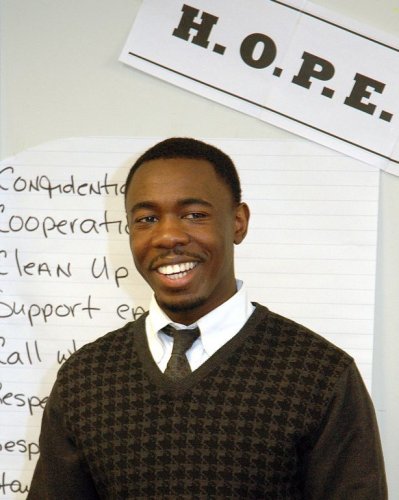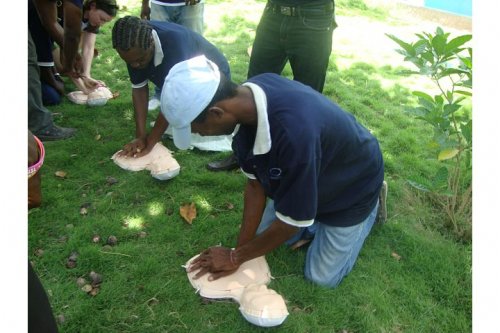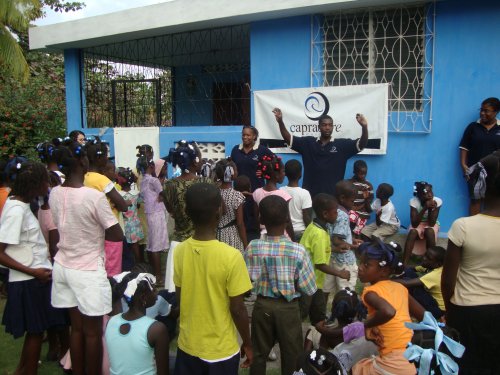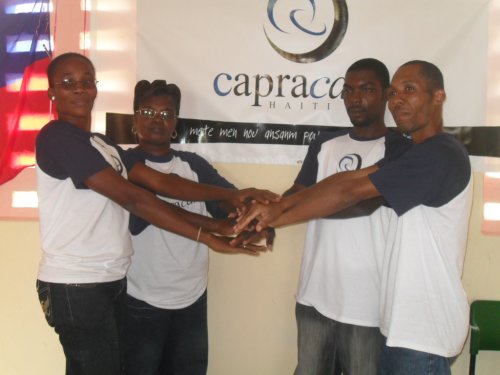Haiti1Stop connects with CapraCare
Founded in April 2009, CapraCare is a non-profit community health organization that addresses the health concerns of the residents of Fonfrede, Haiti, by promoting school-based health programs, preventive health care, nutrition and mental health services and by working closely with neighboring schools and hospitals . They rely on their volunteers in Haiti and overseas to achieve their services and training. According to CapraCare, they stand as the only Haitian non-governmental organization in Fonfrede that provides access to preventive care and other medical necessities in the city. Everyone has access to their services regardless of their ability to pay. CapraCare needs committed individuals with different skills sets to support them in achieving their long term vision to a healthier community at Fonfrede.
 Haiti1Stop had the pleasure of connecting with the Founder/Executive Director of CapraCare, Jean Pierre-Louis, on their work at Fonfrede. Mr. Jean Pierre-Louis has been instrumental in putting CapraCare on the front line and has an endearing passion for the organization that he founded in 2009. After our initial contact with CapraCare, we felt compelled to feature this incredible organization in a Q&A format. Their exemplary work reflects how one person with a vision can make a difference through determination and hard work. Haiti1Stop would recommend everyone to read about CapraCare and support them either through monetary donations or volunteerism.
Haiti1Stop had the pleasure of connecting with the Founder/Executive Director of CapraCare, Jean Pierre-Louis, on their work at Fonfrede. Mr. Jean Pierre-Louis has been instrumental in putting CapraCare on the front line and has an endearing passion for the organization that he founded in 2009. After our initial contact with CapraCare, we felt compelled to feature this incredible organization in a Q&A format. Their exemplary work reflects how one person with a vision can make a difference through determination and hard work. Haiti1Stop would recommend everyone to read about CapraCare and support them either through monetary donations or volunteerism.
Below is a glance at CapraCare’s initiatives and positive work in Fonfrede. We will feature more of CapraCare in the future as we see this organization evolving.
Haiti1Stop: Does CapraCare intend to open a clinic in Fonfrede in the long run?
Jean Pierre: Yes, CapraCare plans to open a health clinic in Fonfrede that will be well equipped with a medical team that will provide health services such as physical examinations, dental, HIV testing and support, and more comprehensive health services to the community.
Haiti1Stop: Does the organization plan to extend its services to other areas of Les Cayes or in Haiti?
Jean Pierre: Yes, CapraCare is strategically planning to have our program implemented in as many communities throughout Haiti as resources allowed.
Haiti1Stop: How many individuals does CapraCare serve in a year with the types of services provided?
Jean Pierre: We provide services to approximately 1,500 people annually.
Haiti1Stop: How has the community responded to the health education and the psychological support specifically post earthquake?
 CPR Workshop |
Jean Pierre: The community has responded very well to our health education program. We find our participants are eager to learn about preventive health issues. They have been well attended with an average of 25-30 participants at the health education workshops and 125 – 150 participants at the community health fairs. We are working very hard to provide these services at the highest quality, enjoyable, and meaningful with the hope to receive support to conduct them at a higher frequency.
Haiti1Stop: Are people of Fonfrede open to the psychosocial program and does CapraCare have enough volunteers in this field?
Jean Pierre: At CapraCare, we believe there is no health without mental as a result it’s very important to provide mental health support. Prior to the Haiti earthquake, we found that people were not so receptive and didn’t understand the importance of mental health support as they kept referring to the stigmas associated with such service. However, immediately after the Haiti earthquake, it became the #1 service people were asking to receive from our program. And, since a lot of people still believe in some of the negative stigmas associated with mental health, CapraCare is using a community model and taking a traditional healing approach to provide such services; in addition, since the infrastructure of neither Haiti nor CapraCare has the capacity to support the more advance traditional western interventions such as psychotherapy, pharmacotherapy, etc, we believe our strategy will provide equally beneficial outcomes.
Haiti1Stop: Would you share with us which group (adults vs. children vs. elderly) has been more receptive to the mental health program?
Jean Pierre: The adults, children, and elderly all have been equally receptive at participating in our mental health supported services. We believe this because our program has been very creative and innovative with identifying activities to keep each group engaged. However, the children by far is a much bigger challenge to service since they require a lot more resources, monitoring, and closer supervision.
Haiti1Stop: What has been your biggest challenge in:
a) Starting such an endeavor in Fonfrede?
 Jean Pierre: Fortunately for me, the challenges were not very difficult I was always connected to the community. As a child, I was very active in my community resulting in me becoming a very popular kid throughout the town. So, at 9 years old I was heartbroken after leaving Haiti, as I did not want to leave my community behind. And, since I couldn’t take my entire community with me, I always wanted to stay connected as I knew that connection would become extremely important for me to one day return with help to make life better for all of them.
Jean Pierre: Fortunately for me, the challenges were not very difficult I was always connected to the community. As a child, I was very active in my community resulting in me becoming a very popular kid throughout the town. So, at 9 years old I was heartbroken after leaving Haiti, as I did not want to leave my community behind. And, since I couldn’t take my entire community with me, I always wanted to stay connected as I knew that connection would become extremely important for me to one day return with help to make life better for all of them.
Haiti1Stop: b) Implementing the programs in the community of Fonfrede?
Jean Pierre: The community of Fonfrede embraces CapraCare as they know this is one of their own bringing help with no hidden motives or agenda. They trust CapraCare efforts and are very proud to be involved hands-on in its daily operation. So, implementing CapraCare’s programs is a matter of having the ability to continue receiving resources and support from caring individuals, courageous friends, and Haitian Diasporas community living abroad as the local community does not have the means to financially support CapraCare efforts.
Haiti1Stop: Is there a protocol to follow to become a CapraCare volunteer?
 Jean Pierre: The protocol to becoming a CapraCare volunteer is simple. The person needs to express interest by informing us via email at info@capracare.org.
Jean Pierre: The protocol to becoming a CapraCare volunteer is simple. The person needs to express interest by informing us via email at info@capracare.org.
While we are eager to find volunteer help, we are careful when accepting the services you offer. If you contact CapraCare to offer to volunteer your time, you may be asked to come in for an interview, fill out a volunteer application, or describe your qualifications and your background just as you would at an interview for a paying job. It is in the organization’s interest and more beneficial to the people it serves to make certain you have the skills needed, that you are truly committed to doing the work, and that your interests match those of CapraCare.
We also offer virtual volunteering. If you have computer access and the necessary skills, we now offer the opportunity to do volunteer work over the computer. This might take the form of working on our website, multi-media, health curriculums, marketing, social networks, newsletter, translation, etc. This sort of volunteering might be well suited to you if you have limited time, no transportation, or a physical disability that precludes you from getting about freely. We work with college students as interns the same way.
Haiti1Stop: What is the minimum hours of commitment do you accept for the virtual volunteering? Again, anyone interested in participating should send an email to info@capracare.org?
Jean Pierre: We normally ask a minimum of six months commitment or we quantify the deliverable for the volunteer. For example, a person may volunteer 5+ hours a week; or the persons is a trainer and/or curriculum developer and is willing to provide CapraCare with two or three workshops. We try to be very flexible.
Yes, the first step is informing us that they are interested via email at info@capracare.org.
Haiti1Stop: What are CapraCare’s current needs?
Jean Pierre: CapraCare needs professionals to render their pro-bono services in the following areas: Grant writing, Marketing, Fundraising, Resource Developing, and Haitian Creole Translating. These needs will be ongoing as CapraCare continues to grow and expand to other parts of Haiti.
To contact Jean Pierre-Louis or send an inquiry to CapraCare for donations or volunteerism, send your inquiries to: info@capracare.org.
CapraCare is also listed under our Healthcare Education, Local/NGO, and Volunteer sections
Haiti1Stop extends their appreciation to Mr. Jean Pierre-Louis for providing us with pictures of CapraCare’s workshops as well as their partners’ contact information in Fonfrede. CapraCare has an upcoming fundraising event for Haiti on January 19th 2012.

